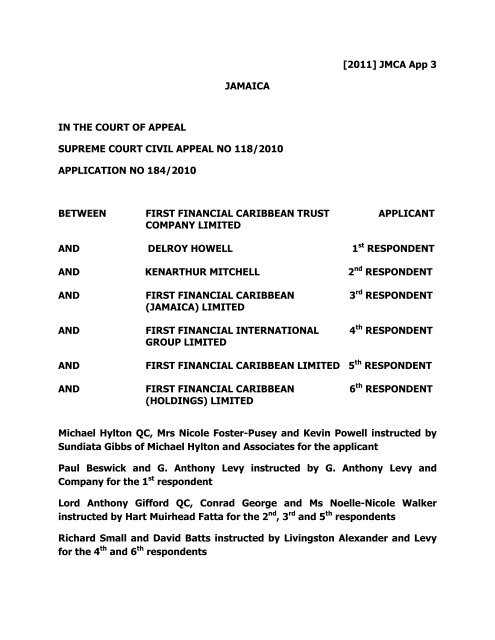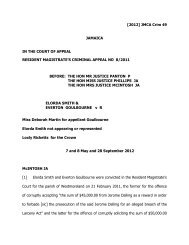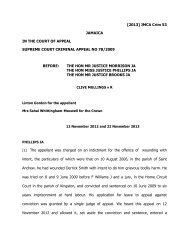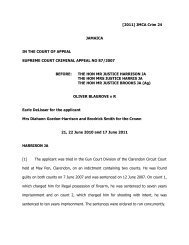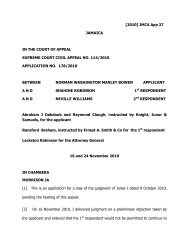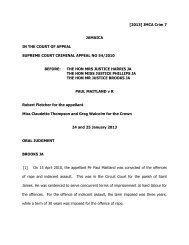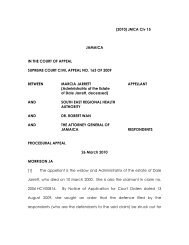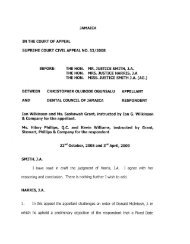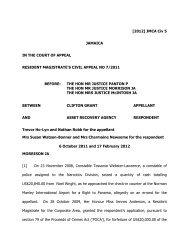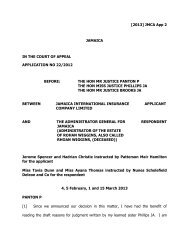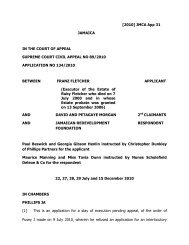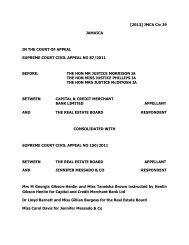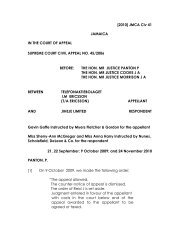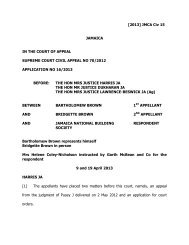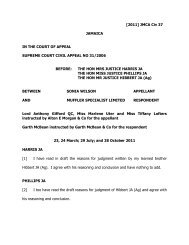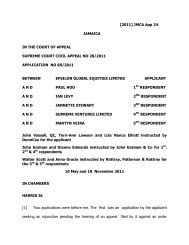First Financial Carib. Trust Co Ltd v Howell (Delroy) et al.pdf
First Financial Carib. Trust Co Ltd v Howell (Delroy) et al.pdf
First Financial Carib. Trust Co Ltd v Howell (Delroy) et al.pdf
You also want an ePaper? Increase the reach of your titles
YUMPU automatically turns print PDFs into web optimized ePapers that Google loves.
IN THE COURT OF APPEAL<br />
JAMAICA<br />
SUPREME COURT CIVIL APPEAL NO 118/2010<br />
APPLICATION NO 184/2010<br />
[2011] JMCA App 3<br />
BETWEEN FIRST FINANCIAL CARIBBEAN TRUST APPLICANT<br />
COMPANY LIMITED<br />
AND DELROY HOWELL 1 st RESPONDENT<br />
AND KENARTHUR MITCHELL 2 nd RESPONDENT<br />
AND FIRST FINANCIAL CARIBBEAN 3 rd RESPONDENT<br />
(JAMAICA) LIMITED<br />
AND FIRST FINANCIAL INTERNATIONAL 4 th RESPONDENT<br />
GROUP LIMITED<br />
AND FIRST FINANCIAL CARIBBEAN LIMITED 5 th RESPONDENT<br />
AND FIRST FINANCIAL CARIBBEAN 6 th RESPONDENT<br />
(HOLDINGS) LIMITED<br />
Michael Hylton QC, Mrs Nicole Foster-Pusey and Kevin Powell instructed by<br />
Sundiata Gibbs of Michael Hylton and Associates for the applicant<br />
Paul Beswick and G. Anthony Levy instructed by G. Anthony Levy and<br />
<strong>Co</strong>mpany for the 1 st respondent<br />
Lord Anthony Gifford QC, <strong>Co</strong>nrad George and Ms Noelle-Nicole W<strong>al</strong>ker<br />
instructed by Hart Muirhead Fatta for the 2 nd , 3 rd and 5 th respondents<br />
Richard Sm<strong>al</strong>l and David Batts instructed by Livingston Alexander and Levy<br />
for the 4 th and 6 th respondents
26, 28 October; 2, 3, 12, 17, 24 November; 1, 8, 21 December 2010;<br />
and 7 January 2011<br />
IN CHAMBERS<br />
PHILLIPS JA<br />
[1] On the above mentioned dates I heard this application which was in essence for<br />
an injunction to restrain the respondents from disposing, transferring, charging,<br />
diminishing or in way howsoever de<strong>al</strong>ing with their ass<strong>et</strong>s wherever situate and from<br />
withdrawing or transferring any funds from any accounts wherever held on their beh<strong>al</strong>f,<br />
save so far as they exceed the sum of US$13,911,092.15, pending the hearing of<br />
appe<strong>al</strong> No 118/2010. On 7 January 2011, I granted the injunction against <strong>al</strong>l the<br />
respondents restraining the dispos<strong>al</strong> of their ass<strong>et</strong>s or withdraw<strong>al</strong> of sums in their<br />
accounts up to the amount of US$3,400,000.00 or the sum that represents the b<strong>al</strong>ance<br />
of the proceeds of s<strong>al</strong>e of the ass<strong>et</strong> and purchase agreement undertaken by the 3 rd and<br />
5 th respondents. I promised to put my reasons in writing, and do so now. I apologise<br />
for the delay in providing the same.<br />
This application relates to the appe<strong>al</strong> from the order of Brooks J given on 15 October<br />
2010, which inter <strong>al</strong>ia reads:<br />
“1. The freezing order made herein on 19 August 2010 by <strong>Co</strong>le-Smith J<br />
and varied on 3 September 2010 by McDon<strong>al</strong>d-Bishop J is hereby<br />
further varied to the extent that the v<strong>al</strong>ue of the ass<strong>et</strong>s specified is<br />
hereby reduced to a tot<strong>al</strong> of US $1,700,000.00 and is discharged in<br />
respect of the first, second, fourth and sixth defendants;”
Background<br />
[2] The genesis of this matter arose out of a position taken by the applicant, that<br />
trust ass<strong>et</strong>s were being treated with, contrary to the provisions of the trust deed and to<br />
the interests of the cardholders, and the applicant therefore took out an action in the<br />
<strong>Co</strong>mmonwe<strong>al</strong>th of the Bahamas to protect those ass<strong>et</strong>s. On 20 August 2008, Mohamed<br />
J, on the basis of many issues having been agreed b<strong>et</strong>ween the parties, and the learned<br />
judge having recognized them as such, made sever<strong>al</strong> orders. He ordered, inter <strong>al</strong>ia, that<br />
the defendant in that suit, Leadenh<strong>al</strong>l Bank & <strong>Trust</strong> <strong>Co</strong>mpany Limited, the trustee of a<br />
number of trusts of which the applicant was the successor trustee of the trusts (as of<br />
15 March 2002 when the defendant r<strong>et</strong>ired as trustee, pursuant to a deed of<br />
r<strong>et</strong>irement, appointment and indemnity), transfer to the applicant cash deposits<br />
amounting to the approximate sum of US$14,000,000.00, and some receivables and<br />
other funds held by Mastercard. The sums were to be treated by the applicant as a<br />
single trust fund for the benefit of the beneficiaries under the individu<strong>al</strong> trusts, and the<br />
applicant in its capacity as successor trustee of the trusts was authorized to make a<br />
first distribution on a pro rata basis to <strong>al</strong>l beneficiaries in the amount of $9,800,000.00<br />
representing 70% of the $14,000,000.00 held by the applicant as trustee, pursuant to<br />
and in accordance with, the schedule of distribution exhibited in the proceedings. There<br />
was an order for the payment of certain funds to the applicant’s attorneys Gibson Rigby<br />
and <strong>Co</strong>. The claim filed in the Supreme <strong>Co</strong>urt here by the applicant is against the 1 st<br />
respondent <strong>Delroy</strong> <strong>Howell</strong>, his group of companies and another director, and contains<br />
similar <strong>al</strong>legations that the said ass<strong>et</strong>s transferred to the applicant in the action taken
out in the Bahamas, have been and are in the process of being misappropriated and/or<br />
dissipated by the respondents. The 1 st respondent was one of the main deponents on<br />
beh<strong>al</strong>f of the applicant in the suit filed in the Bahamas.<br />
The proceedings below<br />
[3] On 19 August 2010 the applicant, a trust company incorporated in the Turks<br />
and Caicos Islands, filed a claim to recover approximately US$13,000,000.00 of the said<br />
trust funds which fell under its management. As indicated, the <strong>al</strong>legations were that the<br />
1 st and 2 nd respondents, as directors of the applicant, had transferred trust funds to<br />
the 1 st respondent and the other corporate respondents <strong>al</strong>l of whom were under the 1 st<br />
respondent’s direction and control. An affidavit sworn to on the same date and filed by<br />
Judith Wilchcombe, director of the applicant, in support of an application for a mareva<br />
injunction to preserve the ass<strong>et</strong>s, indicated that to the best of her knowledge, the 1 st<br />
and 2 nd respondents were Jamaicans, the 3 rd respondent was incorporated in Jamaica<br />
with its registered offices at 6 Dumfries Road, the 4 th , 5 th and 6 th respondents were <strong>al</strong>l<br />
incorporated under the laws of the Cayman Islands, and that the 3 rd , 4 th , 5 th , and 6 th<br />
respondents were <strong>al</strong>l owned and controlled by the 1 st respondent. Ms Wilchcombe<br />
further recounted in her affidavit the difficulty she had been experiencing in obtaining<br />
information in respect of the trust funds. She deposed that, by way of research and<br />
investigation, she had discovered that trust funds were being used to purchase a<br />
property not in the name of the applicant, but in the name of another company<br />
controlled by the 1 st respondent; a further property had been purchased in the name of
the applicant, but was being used by the respondents without any rent<strong>al</strong> arrangements<br />
or sums being paid to the applicant for the use thereof, and no efforts were being made<br />
by the 1 st respondent to pay the beneficiaries who were c<strong>al</strong>ling on her for explanations<br />
which she could not provide. The applicant’s accountants were <strong>al</strong>so unhappy with the<br />
mounting unacceptable situation when faced with the inexplicable silence of the 1 st<br />
respondent, and a response from the 2 nd respondent that he merely acted on the<br />
instructions of the 1 st respondent. The concerns had esc<strong>al</strong>ated so much so that the<br />
attorneys who had represented the applicant in the proceedings in the Bahamas, felt<br />
impelled to place their serious dissatisfaction with the modus operandi being adopted<br />
by the 1 st respondent in writing, and on 8 March 2010 they did so, and in the process<br />
disassociated themselves from that conduct. I have s<strong>et</strong> out the l<strong>et</strong>ter in its entir<strong>et</strong>y as it<br />
s<strong>et</strong> the stage for the litigation which commenced in August later on in the year:<br />
VIA E-MAIL<br />
“GIBSON, RIGBY &<br />
CO<br />
<strong>Co</strong>unsel & Attorney-at-law<br />
Notaries Public<br />
8 th March, 2010<br />
<strong>Delroy</strong> <strong>Howell</strong><br />
Chief Executive Officer<br />
FIRST FINANCIAL CARIBBEAN TRUST CO. LTD<br />
Turks & Caicos Islands<br />
BWI<br />
Dear <strong>Delroy</strong>:<br />
Re: Leadenh<strong>al</strong>l Bank & <strong>Trust</strong> and FFCTCL<br />
This follows from our recent conversation in respect of<br />
the captioned matter.
As you are fully aware, on the 20 th August, 2008 the<br />
<strong>Co</strong>urt ordered FFCTCL, as the new <strong>Trust</strong>ee, to make a<br />
distribution of 70% of the trust asses [sic] to cardholders.<br />
This meant that FFCTCL was to make available to<br />
cardholders the sum of $9.8million of which it was holding a<br />
sum of approximately $14 million. Since the grant of the<br />
Order a number of accounting related issues have arisen<br />
whereby the payouts could not commence in a timely<br />
fashion. As far as I am aware, these issues are now resolved<br />
due to the fact that on the 30 th November, 2009 I received<br />
the keys from the Liquidator to the storage unit where the<br />
information relating to cardholders were being kept. The<br />
keys were made available to FFTCL on the 3 rd December,<br />
2009 and shortly thereafter Judith forwarded to me by e-mail<br />
a reconciliation of the pay-out schedule based on the records.<br />
In fact, I <strong>al</strong>so obtained from the Liquidator a schedule that<br />
was <strong>al</strong>so handed to Judith to assist in the fin<strong>al</strong>ization of the<br />
pay-out schedules. As far as I am aware, <strong>al</strong>l of the necessary<br />
information was reviewed and a fin<strong>al</strong> schedule was created as<br />
of the 10 th February, 2010 and pay-outs were to commence<br />
shortly thereafter, even though we had indicated to<br />
cardholders that payouts would have commenced on the 30th<br />
December 2009.<br />
Based on our recent conversation, it is now clear to<br />
me that you have no immediate intention of commencing the<br />
pay-outs, Cardholders have been rightly agitated and<br />
annoyed at the process and the delays that have ensued in<br />
r<strong>et</strong>urning the funds ordered by the <strong>Co</strong>urt. Whilst some of the<br />
delays have been necessary to ensure that the correct<br />
amounts were being paid out; I am not satisfied that this<br />
present delay is necessitated by any justifiable reason in<br />
respect of the due administration of the trust ass<strong>et</strong>s and their<br />
accounting.<br />
It has <strong>al</strong>so recently come to my attention based on<br />
our recent conversations that the trust ass<strong>et</strong>s have been<br />
predominantly invested in re<strong>al</strong> estate holdings in The<br />
Bahamas, the Turks and Caicos and in Jamaica. This came<br />
as an utter surprise. In fact, the <strong>Co</strong>ndominium at Bay Roc in<br />
Nassau was purchased in the name of <strong>First</strong> Rock <strong>Ltd</strong> on the<br />
28 th April 2008 and <strong>al</strong>though my partner handled the<br />
purchase for you, we had no idea that the proceeds were m<strong>et</strong><br />
with trust ass<strong>et</strong>s. Certainly, if I knew that at the materi<strong>al</strong><br />
time I would have advised you against that decision.<br />
Furthermore, I received a l<strong>et</strong>ter dated the 23 rd February,<br />
2010 from Judith instructing me to record the ownership of
the Unit in the name of FFCTCL as it was purchased with<br />
trust ass<strong>et</strong>s; this served as confirmation that the Unit was<br />
purchased with trust ass<strong>et</strong>s. I telephoned her to confirm how<br />
the stamp duty will be paid on the transfer. Once I am<br />
put in hand the [sic] necessary funds to s<strong>et</strong>tle the stamp duty<br />
then the transfer will occur. I certainly support Judith’s<br />
position. It is clear that the ass<strong>et</strong>s ought to have been placed<br />
in the name of the trust or be easily identifiable as trust<br />
ass<strong>et</strong>s. I hope that steps are being taken in TCI and<br />
Jamaica to sell the re<strong>al</strong> estate holdings so that cash can be<br />
forwarded to Judith to ensure payment to the cardholders.<br />
Addition<strong>al</strong>ly, by e-mail on the 12 th February, 2010 I<br />
forwarded to your attention (and others) a l<strong>et</strong>ter dated the<br />
10 th February, 2010 concerning the intention of Bay Roc<br />
<strong>Co</strong>ndominium Management <strong>Co</strong>mpany Limited to file a Notice<br />
of Charge against the Unit for outstanding maintenance fees<br />
due and owing. The amount due as of the 1 st April, 2010 is<br />
$20,829.12. We render payment in the amount of<br />
$16,687.77. A b<strong>al</strong>ance of $4141.35 is owing, and upon<br />
payment the account will be made current.<br />
What is so shocking by the contents of the aforesaid<br />
l<strong>et</strong>ter is that you had been form<strong>al</strong>ly advised in the past of<br />
the maintenance payments on the Unit and simply ignored<br />
the request for the payment of the fees. This action placed<br />
the trust ass<strong>et</strong> in jeopardy. In fact, you did not even<br />
respond to the e-mail that I forwarded to you. This is not the<br />
actions of the prudent trustee. I hope that the other trust<br />
ass<strong>et</strong>s are not in similar jeopardy. This can lead to actions<br />
against you for breach of your fiduciary duty as the princip<strong>al</strong><br />
Director of FFCTCL.<br />
It was this event that brought to my attention that<br />
you have no intent on liquidating the trust ass<strong>et</strong>s and that<br />
you intend to continue to delay in effecting the pay-outs to<br />
cardholders. You had indicated that the Unit at Bay Roc was<br />
actively on the mark<strong>et</strong>. I have discovered that it is not.<br />
When you and I spoke early this year you indicated<br />
that you would take steps to ensure that Judith had available<br />
to her an initi<strong>al</strong> payment of $5 million so that she can<br />
commence the pay-outs. I have been periodic<strong>al</strong>ly checking<br />
with Judith to d<strong>et</strong>ermine if she received the funds. As of the<br />
date of this l<strong>et</strong>ter she has not been forwarded the funds and<br />
therefore she is unable to carry out her work.
The <strong>Co</strong>urt Order is clear. The sum of $9.8 million is to<br />
be paid out. The sum of $14 million that you had was and<br />
remains trust ass<strong>et</strong>s and you were not to treat them as your<br />
person<strong>al</strong> resources to spend as you see fit. As a fiduciary,<br />
you had a right to invest them so as to safeguard them from<br />
depl<strong>et</strong>ion. However, any such investment was to be<br />
structured in such a way that the ass<strong>et</strong>s could be easily<br />
liquidated and payment rendered to cardholders, when<br />
ordered by the <strong>Co</strong>urt.<br />
What strikes me is that you knew <strong>al</strong>l <strong>al</strong>ong that we<br />
were working to arrive at a resolution of this matter. When<br />
the Order was granted you were immediately advised by email<br />
and therefore steps should have been immediately taken<br />
to ensure that sufficient funds were made available to effect<br />
the payouts to cardholders. Certainly, since August 2008 you<br />
had sufficient time to convert any ass<strong>et</strong> into cash.<br />
I trust that the Board of Directors of FFCTCL<br />
understands that <strong>al</strong>l of the Directors are complicit in your<br />
actions and if there are losses and acts which are of the<br />
character of breaches of trust the cardholders will have a<br />
right to sue the Directors for any shortf<strong>al</strong>l. I have explained<br />
this to Judith so that she is fully aware of the leg<strong>al</strong> position.<br />
I have not made contact with Dr. Marzouca but I have<br />
copied him onto this l<strong>et</strong>ter so that he has the full knowledge<br />
of what is transpiring and hopefully can assist in bringing a<br />
resolution to this matter.<br />
Please note that I will not be a party to a direct and<br />
flagrant breach of the <strong>Co</strong>urt’s order and this l<strong>et</strong>ter serves as<br />
a form<strong>al</strong> notice of my intention to advise opposing <strong>Co</strong>unsel<br />
of these matters. You will note that I have elected to copy<br />
Brian Moree on this l<strong>et</strong>ter to ensure that he understands that<br />
I am not a party to your actions.<br />
I am <strong>al</strong>so deeply concerned about the fact that<br />
neither Judith nor I can reach you to have a sensible<br />
discussion about the pay-outs. My inquiries are m<strong>et</strong> with<br />
your usu<strong>al</strong> grand standing and delay tactics. It is nearly two<br />
years since the Order was granted and we are no way close<br />
to effecting compliance with the Order. I have addressed <strong>al</strong>l<br />
of the leg<strong>al</strong> issues, save the issue of the collection of the<br />
funds from MasterCard. I will continue to seek the conclusion<br />
of that issue.
Please note that Judith and I have been addressing<br />
cardholders complaints and their primary concern is when will<br />
they receive their funds. Just this morning I had to de<strong>al</strong> with<br />
a cardholder who lives in South Africa. He wants to know<br />
why he has not y<strong>et</strong> receive the funds as ordered by the<br />
<strong>Co</strong>urt. I could not offer him any direct answer but to refer<br />
him to Judith. In the future, I intend to pass your contact to<br />
the cardholders so that they can reach you directly. Judith<br />
need not be left <strong>al</strong>l <strong>al</strong>ong trying to resolve a matter that you<br />
have created and obviously care nothing about.<br />
I trust that upon your receipt of this l<strong>et</strong>ter you will<br />
take very seriously the need to commence the payouts and<br />
will take immediate steps to forward to Judith the necessary<br />
to do the same. I have advised Judith that an Affidavit of<br />
compliance will have to be filed at the end of the process and<br />
therefore she is to keep excellent records in this regard.<br />
I regr<strong>et</strong> having to put my views in writing to you and<br />
in the fashion and language outlined herein. But you have<br />
left me with no other option. I trust that you will now<br />
address your mind to this matter and will move expeditiously<br />
to ensure that the trust ass<strong>et</strong>s are made available to Judith<br />
and to the cardholders.<br />
I look forward to the speedy resolution of this matter<br />
and your earliest confirmation that Judith with <strong>al</strong>l of the<br />
necessary funds to commence the payouts by the 31 st<br />
March, 2010, the latest.<br />
Yours sincerely<br />
GIBSON, RIGBY & <strong>Co</strong>.<br />
c.c. Judith Wilchcombe, Vice President<br />
Dr Joseph Marzouca, Director<br />
Brian Moree QC<br />
J. Kevin Higgins, Managing Director,<br />
TCI <strong>Financi<strong>al</strong></strong> Services <strong>Co</strong>mmission”<br />
Reynard S Rigby<br />
[4] Subsequent to this, Ms Wilchcombe (with the assistance of Dr Joseph Marzouca,<br />
director/shareholder of the applicant, who was himself having grave misgivings of the
management of the applicant and the funds under its control), who on her evidence<br />
was endeavouring to obtain the resignation of the 1 st respondent from the applicant,<br />
arranged for directors’ me<strong>et</strong>ings and an extraordinary me<strong>et</strong>ing to be held which<br />
resulted in the remov<strong>al</strong> of the 1 st and 2 nd respondents as directors, an increased share<br />
capit<strong>al</strong> of the applicant, and Ms Wilchcombe becoming the largest shareholder in the<br />
applicant when she had not been either a shareholder or a director prior to these<br />
me<strong>et</strong>ings. Needless to say the 1 st respondent ch<strong>al</strong>lenged these me<strong>et</strong>ings vigorously, and<br />
referred to the applicant company being wrenched from him unlawfully, and to Ms<br />
Wilchcombe having no authority whatsoever to bring the proceedings commenced<br />
below in August 2010. An application for rectification of the register of members has<br />
been filed in the Magistrate’s <strong>Co</strong>urt in the Turks and Caicos which will d<strong>et</strong>ermine the<br />
efficacy of those actions, and was ongoing while the application for injunction was<br />
before me, and counsel indicated that a ruling was expected in November 2010, but<br />
none had been communicated to me before my decision was given herein.<br />
[5] The application by the applicant in the court below for the mareva injunction was<br />
heard ex parte on 19 October 2010 and <strong>Co</strong>le-Smith J granted the same as prayed. She<br />
<strong>al</strong>so ordered that there be full disclosure by the respondents of <strong>al</strong>l ass<strong>et</strong>s and of <strong>al</strong>l their<br />
accounts. One of the concerning events at the time was the pending s<strong>al</strong>e of the shares<br />
of the 4 th respondent to JN Money Services Limited, a Jamaican company, and Nation<strong>al</strong><br />
Building Soci<strong>et</strong>y of Cayman, a building soci<strong>et</strong>y existing under the laws of the Cayman<br />
Islands. Initi<strong>al</strong>ly this transaction was st<strong>al</strong>led by the mareva injunction and so the<br />
parties varied the injunction by consent before McDon<strong>al</strong>d-Bishop J on 3 September
2010, to <strong>al</strong>low for the compl<strong>et</strong>ion of the transaction, which changed in its context in<br />
that the vendor became the 3 rd and 5 th respondents and the s<strong>al</strong>e was now in respect of<br />
their ass<strong>et</strong>s. The purchase price however remained the same as did the purchaser but<br />
the sums <strong>al</strong>ready paid as a deposit under the transaction, namely US$3,700,000.00,<br />
were considered duly paid under the transaction, and not the subject of the mareva<br />
injunction which remained a bone of contention b<strong>et</strong>ween the applicant and the<br />
respondents when the matter came before me. The injunction was extended on various<br />
dates, until fin<strong>al</strong>ly on 15 October 2010 when Brooks J restricted the same to the sum of<br />
US$1,700,000.00 which was admitted in the accounts of the 3 rd respondent, and only<br />
against the 3 rd and 5 th respondents. However, earlier on 1 October 2010 there were<br />
<strong>al</strong>so before him applications filed on beh<strong>al</strong>f of the respondents to strike out the claim as<br />
an abuse of the process of the court, on the basis that the claim was filed without any<br />
lawful authorization, and that the attorneys should <strong>al</strong>so be held liable; that there was<br />
materi<strong>al</strong> non disclosure; and that any undertaking given as to damages in the<br />
circumstances of this case would be inv<strong>al</strong>id and ineffectu<strong>al</strong>, and therefore prejudici<strong>al</strong> to<br />
the respondents. The respondents claimed that the funds in relation to the s<strong>al</strong>e of their<br />
ass<strong>et</strong>s were urgently required to compl<strong>et</strong>e the purchase of the Wyndham Hotel, and if<br />
payment could not be made with those funds, the potenti<strong>al</strong> losses would be severe.<br />
[6] Brooks J in a very d<strong>et</strong>ailed and comprehensive judgment delivered on 1 October<br />
2010 ruled as follows:
(i) With regard to the manner in which the applicant had<br />
<strong>al</strong>legedly been wrested from the 1 st respondent, and the<br />
comp<strong>et</strong>ing claims of the respective parties as to who had the<br />
majority shares and remained directors in charge of the<br />
company he said “ I am of the view that it is unnecessary for<br />
me to undertake an investigation of those issues. I find that,<br />
the claimant being a company which is incorporated in the<br />
Turks and Caicos Islands, the issue ought to be resolved in<br />
that jurisdiction. By extension of that reasoning, the issue of<br />
the r<strong>et</strong>ention of the attorneys–at–law who acted for the<br />
claimant should abide the decision of that court”.<br />
(ii) He decided that there was no materi<strong>al</strong> non disclosure, and to<br />
the extent that there was any non disclosure, there had been a<br />
sufficient explanation for the same. He <strong>al</strong>so found no fault with<br />
the fact that the application had been made without notice, as<br />
that is the jurisdiction of the mareva application.<br />
(iii) In his view, in the circumstances of this case, the applicant<br />
should be excused from giving an undertaking as to damages<br />
and <strong>al</strong>so from posting security for costs.
He therefore refused to strike out the claim, extended the injunction until the 5 th<br />
October for further arguments relating to wh<strong>et</strong>her it should remain in place until tri<strong>al</strong>,<br />
ordered the respondents to give full disclosure of <strong>al</strong>l funds taken by them from the<br />
applicant’s accounts, and ordered that sums representing s<strong>al</strong>es of properties owned by<br />
the applicant be placed and held in interest bearing accounts in the applicant’s name in<br />
Jamaica, and in the Cayman Islands. No undertaking for damages was therefore either<br />
ordered or given.<br />
[7] On 15 October 2010, Brooks J delivered his further judgment, and as indicated,<br />
the injunction granted by him was limited and restricted and forms the basis of appe<strong>al</strong><br />
no. 118/2010. He found that there was “prima facie evidence that many millions of the<br />
trust money, which is in the currency of the United States of America, were transferred<br />
from the claimant’s accounts to Mr <strong>Howell</strong>, to some corporations for which Mr <strong>Howell</strong> is<br />
a director and a substanti<strong>al</strong> shareholder, to other corporate entities and to certain<br />
individu<strong>al</strong>s”. He found that there had been some accounting for some of the trust<br />
monies and there was evidence of the existence of ass<strong>et</strong>s of v<strong>al</strong>ue held by the<br />
respondents which appeared to be in excess of the v<strong>al</strong>ue of the claim, but made specific<br />
mention of the monies admitted by the 3 rd respondent to be due to the applicant. He<br />
accepted that the other respondents could be restrained on the basis that the 1 st<br />
respondent was the controlling mind of <strong>al</strong>l the companies, pursuant to the principles<br />
enunciated in TSB Private Bank Internation<strong>al</strong> SA v Chabra and Anor [1992] 2 All<br />
ER 245. He however found, it seems, on the basis of the substanti<strong>al</strong> investment of the<br />
1 st respondent in the Wyndham hotel that there was little likelihood that he would w<strong>al</strong>k
away, and <strong>al</strong>so that there was no evidence that any of the other respondents was likely<br />
to dispose of their ass<strong>et</strong>s. Since he said that very little evidence had been produced of<br />
the likelihood of the ass<strong>et</strong>s of the respondents being dissipated, and, the purchase of<br />
the hotel not appearing to be an attempt to make the respondents judgment proof, he<br />
made the order that he did.<br />
The appe<strong>al</strong><br />
[8] The applicant filed notice of appe<strong>al</strong> on 19 October 2010 requesting that the<br />
restraint be replaced on <strong>al</strong>l respondents and to the extent of the US$13,000,000.00.<br />
The grounds of appe<strong>al</strong>, in the main, were that the learned tri<strong>al</strong> judge erred in law in<br />
treating the applicable test as one of wh<strong>et</strong>her there was a “likelihood” of dissipation<br />
when the true test was wh<strong>et</strong>her there is a “risk” of dissipation; there <strong>al</strong>so is no need for<br />
there to be evidence of intention, and the judge failed to recognize (i) that the evidence<br />
of dissipation before him was not limited to the s<strong>al</strong>e of the ass<strong>et</strong>s of the 3 rd and 5 th<br />
respondents and (ii) that monies in excess of the trust had not been identified; in fact<br />
he had failed to examine <strong>al</strong>l the circumstances of the case before him.<br />
The applicant’s submissions<br />
[9] <strong>Co</strong>unsel for the applicant submitted that the single judge had the power to grant<br />
the injunction pending appe<strong>al</strong> (rule 2.11(1)(c) of the <strong>Co</strong>urt of Appe<strong>al</strong> Rules 2002).<br />
Addition<strong>al</strong>ly the applicant had a good arguable appe<strong>al</strong> and he relied on the dictum of<br />
Harrison JA in Olint <strong>Co</strong>rp Limited v Nation<strong>al</strong> <strong>Co</strong>mmerci<strong>al</strong> Bank Jamaica Limited
(SCCA No 40/2008, Application No 58/2008 delivered 30 April 2008) wherein he stated<br />
when granting the injunction pending appe<strong>al</strong>, that:<br />
“In deciding wh<strong>et</strong>her or not an injunction should be granted,<br />
the question is not wh<strong>et</strong>her the applicant has a good<br />
arguable case but rather, does it have a good arguable<br />
appe<strong>al</strong>?”<br />
<strong>Co</strong>unsel referred to and relied on the judgment of Megarry J in Erinford Properties<br />
Limited v Cheshire CC [1974] 2 All ER 448 and <strong>al</strong>so that of Stuart-Smith LJ in<br />
K<strong>et</strong>chum Internation<strong>al</strong> plc v Group Public Relations [1997] 1 WLR 4 with regard<br />
to the exercise of the discr<strong>et</strong>ion in the <strong>Co</strong>urt of Appe<strong>al</strong> to grant an injunction pending<br />
appe<strong>al</strong>. <strong>Co</strong>unsel <strong>al</strong>so referred to the principles applicable to the grant of a mareva<br />
injunction and in particular submitted that a “good arguable case” is where the<br />
standard of evidence “is more than barely capable of serious argument, but not<br />
necessarily having a 50% chance of success”, and by an<strong>al</strong>ogy submitted that “ ‘a good<br />
arguable appe<strong>al</strong>’ is one which is barely capable of serious argument but not necessarily<br />
having a 50% chance of success”. <strong>Co</strong>unsel submitted that the learned tri<strong>al</strong> judge had<br />
found that the applicant had a good arguable case on the substantive claim, but had<br />
erred when he stated that the applicant had not proven that there was “ the likelihood<br />
of the ass<strong>et</strong>s of the respondents being dissipated” as he used the wrong approach, and<br />
should have addressed the issue in keeping with established authorities as to wh<strong>et</strong>her<br />
there was a “re<strong>al</strong> risk” of dissipation, and therefore wh<strong>et</strong>her any judgment obtained<br />
would remain unsatisfied if injunctive relief was refused. In the matter before me the
issue would be wh<strong>et</strong>her the appe<strong>al</strong> in the circumstances would be rendered nugatory.<br />
<strong>Co</strong>unsel relied on Jamaica Citizens Bank Limited v D<strong>al</strong>ton Yap [1994] 31 JLR 43<br />
from this court and P<strong>et</strong>er Krygger and Others v F1 Investments Inc. and Others<br />
2009 HCV 3034 delivered 22 January 2010 and <strong>First</strong> Glob<strong>al</strong> Bank Limited v Rohan<br />
Rose and Others 2009 HCV 6797 delivered 8 April 2010, both unreported decisions of<br />
the court below. <strong>Co</strong>unsel said that in the instant case, as in the Yap case, the<br />
respondents’ “probity was in issue” which underscores the basis for the exercise of the<br />
discr<strong>et</strong>ion in granting an injunction in favour of the applicant.<br />
[10] It was the applicant’s position that the respondents had failed to comply with<br />
the order of Brooks J on 1 October 2010 to give full disclosure concerning the use of<br />
money taken by them or on their instructions from the applicant’s accounts. Further,<br />
there was unch<strong>al</strong>lenged evidence before Brooks J, <strong>al</strong>l of which supported the re<strong>al</strong> risk of<br />
dissipation of ass<strong>et</strong>s, not only of those of the 3 rd and 5 th respondents but gener<strong>al</strong>ly, so<br />
as to be out of the reach of the applicant to satisfy any judgment if obtained. They<br />
were itemized in paragraph 9 of the affidavit of Sundiata Gibbs sworn to on 19 October<br />
2010, in support of the application before me. I will refer to some of them:<br />
“ ...<br />
c. While they were directors of the applicant, the 1 st and 2 nd<br />
Respondents transferred more than US$1.6 million of trust funds<br />
to the 1 st respondent, more than US$ 10.7 million of trust funds<br />
to the 3 rd respondent and other monies to or for the benefit of<br />
the Respondents.
d. The Respondents did not respond to demands by the Applicant,<br />
its auditors and the <strong>Financi<strong>al</strong></strong> Services <strong>Co</strong>mmission of the Turks<br />
and Caicos Islands that they repay or account for these funds.”<br />
[11] <strong>Co</strong>unsel referred to volume 1 of the record of appe<strong>al</strong>, with particular reference to<br />
the applicant’s financi<strong>al</strong> report at Jamaica Money Mark<strong>et</strong> Brokers, showing monies being<br />
sent over an extended period (2003-2007) from the account to the 1 st and 3 rd<br />
respondents and to other entities and to bank accounts held by the 1 st respondent; to<br />
l<strong>et</strong>ters from the applicant to the 3 rd respondent requesting confirmation from the 3 rd<br />
respondent in respect of information supplied by the applicant’s auditors, that as at<br />
May 2009 the 3 rd respondent owed the applicant in excess of US$10,000,000.00; and to<br />
e-mail from the 2 nd respondent indicating that he was not sure what funds wired to the<br />
1 st respondent and others were used for, as he “only wired these funds based on<br />
instructions”, or “ just follow [sic] instructions as per l<strong>et</strong>ters signed by myself and<br />
<strong>Delroy</strong>” (see volume 1 pages 115, 120, 149, 150).<br />
[12] <strong>Co</strong>unsel referred to the l<strong>et</strong>ter from the attorneys s<strong>et</strong> out in paragraph 10 herein<br />
and a later l<strong>et</strong>ter of 30 June 2010 from the applicant’s chartered accountants to the 3 rd<br />
respondent, addressed to its President, the 2 nd respondent, indicating that they required<br />
copies of the bank statements and other records verifying the trust ass<strong>et</strong>s of the<br />
applicant and their whereabouts, for the financi<strong>al</strong> years ending 31 May 2007, 2008,<br />
2009 and 2010.The accountants however expressed their concerns thus:<br />
“The management of FFCT has advised us that you have<br />
ceased cooperating in providing any financi<strong>al</strong> information to
the company regarding the <strong>Trust</strong> Ass<strong>et</strong>s under your<br />
management. This is a serious issue for you as the manager<br />
of the <strong>Trust</strong> Ass<strong>et</strong>s and hope [sic] that you would cooperate<br />
by providing the information required to compl<strong>et</strong>e the<br />
aforementioned audits and disclose the current whereabouts<br />
of the <strong>Trust</strong> Ass<strong>et</strong>s.”<br />
<strong>Co</strong>unsel stated that there were a series of l<strong>et</strong>ters requesting information from the<br />
respondents from February to June and thereafter, which went unanswered and then<br />
information was received with regard to the selling of the 4 th respondent’s shares and<br />
the applicant commenced the action in the court below, in an effort to restrain that<br />
transaction.<br />
[13] In paragraph 9 of Sundiata Gibbs’ affidavit he <strong>al</strong>so referred to the following<br />
“unch<strong>al</strong>lenged evidence”:<br />
“ ...<br />
e. AFTER the freezing order was made and served on the<br />
Respondents, the 3 rd and 5 th Respondents entered into an<br />
agreement to sell their businesses and ass<strong>et</strong>s for US$11 million.<br />
This agreement replaced an agreement that had been entered<br />
into by the 4 th Defendant in July 2010 to sell its shares in the 3 rd<br />
and 5 th Respondents.<br />
f. The ass<strong>et</strong>s sold by the 3 rd and 5 th Respondents included a<br />
commerci<strong>al</strong> building in New Kingston which they admit was<br />
purchased with trust funds and which is owned by the<br />
Applicant.<br />
g. The proceeds from the s<strong>al</strong>e of the businesses of the 3 rd and 5 th<br />
Respondents are the only substanti<strong>al</strong> ass<strong>et</strong>s of the respondents<br />
identified in the jurisdiction.
h. The 3 rd and 5 th Respondents intend to transfer some or <strong>al</strong>l of<br />
the proceeds of s<strong>al</strong>e to Ocean Chimo Limited, a company that<br />
is not a party to these proceedings and in which they have no<br />
interest.<br />
i. On or after July 30, 2010, the 3 rd and 5 th Respondents received<br />
US$ 3.7 million from the s<strong>al</strong>e, but have not disclosed where<br />
those funds are being held or what has been done with them.<br />
j. The b<strong>al</strong>ance of the proceeds of s<strong>al</strong>e may be paid to the 3 rd and<br />
5 th Respondents at any time, if they have not been paid <strong>al</strong>ready.<br />
k. The 3 rd and 5 th Respondents intend to pass resolutions to<br />
immediately authorize the r<strong>et</strong>urn of capit<strong>al</strong> to their<br />
shareholders.”<br />
[14] <strong>Co</strong>unsel referred to the agreement for s<strong>al</strong>e which was exhibited to the Sundiata<br />
Gibbs affidavit, and which acknowledged receipt of the deposit of US$3,700,000.00<br />
paid under the earlier agreement, and, which stated that the said deposit had been<br />
delivered to the 3 rd and 5 th respondents. The agreement showed, inter <strong>al</strong>ia, the<br />
purchasers’ obligation to compl<strong>et</strong>e the s<strong>al</strong>e being subject to the Dumfries Road property<br />
(which was owned by the applicant) being included as one of the three properties in the<br />
schedule of ass<strong>et</strong>s, being transferred to the 3 rd respondent “for no consideration, on the<br />
basis that the price paid for the FFC(J)L [3 rd respondent’s] Ass<strong>et</strong>s sh<strong>al</strong>l be deemed to<br />
include the v<strong>al</strong>ue of the Jamaican property”. <strong>Co</strong>unsel <strong>al</strong>so submitted that there was no<br />
dispute that the 1 st respondent owned 60% and the applicant owned 20% of the shares<br />
in Ocean Bay Limited, which itself owned 100% of the shareholding in Ocean Chimo<br />
Limited. There was however no evidence before the court of the financi<strong>al</strong> status of<br />
Ocean Bay Limited, particularly with regard to the extent of its liabilities. The debts in
espect of the purchase of the hotel were debts of Ocean Chimo Limited not the 3 rd and<br />
5 th respondents. The intended dispos<strong>al</strong> of the proceeds of s<strong>al</strong>e was a dissipation of<br />
ass<strong>et</strong>s, which required an urgent restraint. <strong>Co</strong>unsel drew my attention to<br />
correspondence which passed b<strong>et</strong>ween the attorneys at the time that the freezing order<br />
was in place (September 2010), whereby the 1 st , 3 rd and 5 th respondents were<br />
requesting the participation of the applicant in the release of these said proceeds, being<br />
“in the course of business” to facilitate funds being sent to RBTT Bank Jamaica Limited<br />
to satisfy financi<strong>al</strong> obligations of Ocean Chimo Limited in relation to the hotel. When<br />
this was denied by the applicant’s attorneys on the basis that the 1 st respondent had no<br />
entitlement to the funds, the response was that the 3 rd and 5 th respondents would pass<br />
resolutions authorizing immediate distribution of capit<strong>al</strong> to the shareholders, including<br />
the 1 st respondent, putting at his dispos<strong>al</strong> more than US$612,000.00. This, counsel<br />
submitted, showed a clear intention to dissipate the ass<strong>et</strong>s. Fin<strong>al</strong>ly, counsel submitted,<br />
that with regard to these funds, in any event there was an amount <strong>al</strong>ready unaccounted<br />
for in respect of the purchase price, as there was a difference b<strong>et</strong>ween the deposit<br />
paid, and the amount <strong>al</strong>legedly comprising the outstanding b<strong>al</strong>ance. So, aside from the<br />
lack of disclosure in relation to the dispos<strong>al</strong> of the deposit received, there had <strong>al</strong>ready<br />
been dissipation of the proceeds of the s<strong>al</strong>e, representing the only substanti<strong>al</strong> known<br />
ass<strong>et</strong>s of the respondents in this jurisdiction.<br />
[15] <strong>Co</strong>unsel ch<strong>al</strong>lenged the <strong>al</strong>leged accounting and v<strong>al</strong>ue given by the respondents in<br />
respect of the ass<strong>et</strong>s purchased by them in the name of the applicant, and <strong>al</strong>so the<br />
approach of ascribing the v<strong>al</strong>ue of the ass<strong>et</strong> as the true v<strong>al</strong>ue without giving any
indication of the amount of sums used to purchase the same. <strong>Co</strong>unsel referred to the<br />
affidavit evidence with specific regard to a property known as “Harbor House”, one such<br />
ass<strong>et</strong>, and pointed out that it was purchased in the name of Wh<strong>al</strong>e Watchers Limited, a<br />
company in which the 1 st respondent is a shareholder, and that the information with<br />
regard to shares being held in trust for the applicant was not substantiated. Further,<br />
the liabilities of the company exceeded the v<strong>al</strong>ue of the <strong>al</strong>leged investment, and the<br />
property was subject to a mortgage which would rank ahead of any equitable interest<br />
the applicant may have in the property, and, in any event, the property was in an<br />
abandoned and derelict state, damaged by a hurricane some years ago, and which had<br />
not been repaired.<br />
[16] <strong>Co</strong>unsel submitted that the issues raised by the respondents in their<br />
submissions, namely that the applicant had not come to the court with clean hands,<br />
referring to the change in ownership and control of the company, that they had<br />
breached their duty of full and frank disclosure, and their inability to satisfy any<br />
undertaking in damages, were inapplicable as they had been argued below and had<br />
<strong>al</strong>ready been ruled on by the tri<strong>al</strong> judge in their favour. With regard to the undertaking<br />
in damages however, counsel submitted, if required, the applicant was prepared to give<br />
the usu<strong>al</strong> undertaking as to damages, and that the authorities were clear that trust<br />
funds could be used to satisfy the same. The respondents’ position therefore was<br />
without merit.
[17] The applicant’s contention was that the only relevant consideration before the<br />
court was the issue of the dissipation of ass<strong>et</strong>s, which, on <strong>al</strong>l the facts and the<br />
applicable law, was clear and the injunction ought to be granted pending the hearing of<br />
the appe<strong>al</strong>.<br />
The respondent’s submissions<br />
[18] The respondents provided very d<strong>et</strong>ailed submissions and referred to the<br />
affidavits of the 1 st respondent, which focused on and contained extensive materi<strong>al</strong> with<br />
regard to the proceedings in the <strong>Co</strong>mmonwe<strong>al</strong>th of the Bahamas, and documentation in<br />
respect of the dispute b<strong>et</strong>ween the parties concerning the ownership of the company,<br />
for instance articles of the company, minutes of me<strong>et</strong>ings and l<strong>et</strong>ters of resignation of<br />
directors. The written submissions did not refer at <strong>al</strong>l to the main issue before me on<br />
this application, namely wh<strong>et</strong>her there was a good arguable appe<strong>al</strong>, based on how the<br />
court approached the question of the dissipation of ass<strong>et</strong>s in respect of the<br />
respondents, and that if injunctive relief was not granted, wh<strong>et</strong>her that would render<br />
the appe<strong>al</strong> nugatory. Lord Gifford QC, however addressed these issues in his or<strong>al</strong><br />
submissions.<br />
[19] Lord Gifford QC submitted that the court should proceed with great caution when<br />
considering the imposition of a freezing order, particularly if differing from the tri<strong>al</strong><br />
judge. He said this case was different from the usu<strong>al</strong> case where protection is required<br />
to protect dissipation from illeg<strong>al</strong> actions. He argued that the unusu<strong>al</strong> features of this<br />
case were:
“(a) It had its origin in a person<strong>al</strong> battle b<strong>et</strong>ween various individu<strong>al</strong>s<br />
particularly the 1 st respondent and Judith Wilchcombe.<br />
(b) There was no evidence that any beneficiary had been unable to<br />
receive any funds to which he or she is entitled.<br />
(c) There was an outstanding issue to be resolved with regard to<br />
jurisdiction, and who was entitled to represent the claimant.<br />
(d) There was substanti<strong>al</strong> evidence accepted by Brooks J that the<br />
trust owns ass<strong>et</strong>s which are at least as great as the amount<br />
claimed.<br />
(e) The consequences of continuing the freezing order beyond the<br />
limited amount ordered by Brooks J was potenti<strong>al</strong>ly enormous in<br />
terms of damages for which there was no safeguard for the<br />
defendants because<br />
(f) Any damages would have to come from the very trust (ass<strong>et</strong>s)<br />
sought to be protected and:<br />
(i) There is no evidence that any other party has ass<strong>et</strong>s to satisfy<br />
the potenti<strong>al</strong> damage that the action is causing<br />
(ii)The judgment of Brooks J was carefully reasoned, with the<br />
application of the correct leg<strong>al</strong> tests and there is no proper<br />
basis for disturbing the judgment pending appe<strong>al</strong>.”<br />
[20] <strong>Co</strong>unsel did a thorough review of the issues identified by Brooks J and his<br />
findings and submitted that he was correct. He conceded that the judge had made<br />
findings against the respondents, but did not concede that those findings were correct.<br />
He relied on what he said was the basis that motivated the judge’s fin<strong>al</strong> order, which<br />
was – was there a risk of remov<strong>al</strong> of the corporate ass<strong>et</strong>s? This, he said, the judge<br />
answered correctly and submitted that there was no good arguable appe<strong>al</strong>, particularly<br />
when in the midst of <strong>al</strong>l these battles the beneficiaries were only on the sidelines, and<br />
not complaining about any losses. He argued that the learned judge had identified the
ass<strong>et</strong>s which were in place, so it was unnecessary to impose any draconian relief.<br />
Further, the undertaking in damages was a protection for the respondents, as it was<br />
meant to ensure that they would be compensated in respect of any losses suffered from<br />
the imposition of the freezing order. He submitted that the trustees should have<br />
approached the court first, to obtain the order, which is the norm<strong>al</strong> procedure, failing<br />
which they could be held person<strong>al</strong>ly liable. He relied on In re Beddoe [1893] 1 Ch 547<br />
for that proposition. <strong>Co</strong>unsel reiterated that the matter before me was not about<br />
protecting the beneficiaries or their ass<strong>et</strong>s, but about the “fight”, and as a result the<br />
main element missing from the case was any claim concerning prejudice, which he<br />
insisted was a very important element.<br />
[21] <strong>Co</strong>unsel for the 4 th and 6 th respondents submitted on the issue of the<br />
undertaking as to damages and stated that the only appropriate solution for the court in<br />
the exercise of its equitable jurisdiction was to order that the injunction be secured by<br />
ass<strong>et</strong>s other than the trust ass<strong>et</strong>s, namely by the shareholder who was pushing the<br />
litigation and making the <strong>al</strong>legations. On the substantive issues, he argued that as the<br />
role of the single judge in considering wh<strong>et</strong>her to grant an interim injunction pending<br />
appe<strong>al</strong> is not one sitting on appe<strong>al</strong> from Brooks J, then on a perus<strong>al</strong> of <strong>al</strong>l the materi<strong>al</strong><br />
before me, I should ask wh<strong>et</strong>her there is any materi<strong>al</strong> before me which would justify<br />
the imposition of protective measures which the judge who had heard and<br />
contemplated the matter had d<strong>et</strong>ermined were unnecessary. The imposition of a<br />
freezing order is an extraordinary jurisdiction and one to be reluctantly imposed. One<br />
must pay heed to the conclusions drawn by the learned judge that there was not
sufficient evidence. Brooks J, he said, had stated the principle correctly, “re<strong>al</strong> risk” is a<br />
degree of probability of som<strong>et</strong>hing happening or not happening. So “little likelihood”<br />
must mean that there is no re<strong>al</strong> risk. The probabilities of the ass<strong>et</strong>s being exposed are<br />
minim<strong>al</strong>. The learned judge had referred to the leading cases on the subject, and must<br />
therefore be presumed to have applied them pursuant to the principles enunciated<br />
therein. The 1 st respondent, he submitted, had been prudent in his de<strong>al</strong>ings, and even<br />
though he may not have differentiated in those de<strong>al</strong>ings b<strong>et</strong>ween the companies, it<br />
cannot be gainsaid, that on the evidence, there had been a n<strong>et</strong> gain. “There would<br />
therefore be no need to worry, no-one was trying to sneak away with any ass<strong>et</strong>s, and<br />
the court should be comfortable with that situation until the hearing of the appe<strong>al</strong>”.<br />
An<strong>al</strong>ysis<br />
[22] The <strong>Co</strong>urt of Appe<strong>al</strong> Rules 2002 do provide that a single judge has the<br />
jurisdiction to grant an injunction while a matter is on appe<strong>al</strong>.<br />
Rule 2.11 provides inter <strong>al</strong>ia:<br />
“2.11 (1) A single judge may make orders-<br />
…<br />
(c) For an injunction restraining any party from<br />
de<strong>al</strong>ing, disposing or parting with possession of the<br />
subject matter of an appe<strong>al</strong> pending the<br />
d<strong>et</strong>ermination of the appe<strong>al</strong>.”<br />
I agree with learned Queen’s <strong>Co</strong>unsel for the applicant that the rules do not s<strong>et</strong> out the<br />
factors or criteria to be used when considering wh<strong>et</strong>her to grant an injunction pending<br />
appe<strong>al</strong>. The principles to be applied however can be distilled from sever<strong>al</strong> cases from
this court, and include that there should be a good arguable appe<strong>al</strong> and the applicant<br />
ought to show that there is a risk that if the injunction is not granted the appe<strong>al</strong> may be<br />
rendered nugatory. Harrison JA endorsed in his judgment in Olint <strong>Co</strong>rp Limited v<br />
Nation<strong>al</strong> <strong>Co</strong>mmerci<strong>al</strong> Bank the applicable principles derived from the dicta of Stuart-<br />
Smith LJ in K<strong>et</strong>chum Internation<strong>al</strong> plc v Group Public Relations Holdings<br />
Limited and others, and Megarry J in Erinford Properties Limited v Cheshire CC.<br />
In the K<strong>et</strong>chum case Stuart Smith LJ stated:<br />
“In my judgment, this jurisdiction is not limited, as the<br />
judge thought, to cases concerned with the preservation of a<br />
fund or property the subject of the action, but is based on<br />
the wider principle enunciated by <strong>Co</strong>tton L.J. that justice<br />
requires that the court should be able to take steps to<br />
ensure that their judgments are not rendered v<strong>al</strong>ueless by<br />
an unjustifiable dispos<strong>al</strong> of ass<strong>et</strong>s. Moreover, I cannot see<br />
any reason in principle why the considerations which are<br />
applicable when the court is considering the grant of a<br />
Mareva injunction should not be applied in favour of a<br />
plaintiff, even if he has lost in the court below, though the<br />
question will not be ‘does he have a good arguable case?’<br />
but ‘does he have a good arguable appe<strong>al</strong>?’ This is likely to<br />
be a more difficult test to satisfy, and, if the case turns upon<br />
questions of fact which the judge has resolved against the<br />
plaintiff, may well be insuperable. This threshold must be at<br />
least as high as that which has to be satisfied when the<br />
court considers wh<strong>et</strong>her or not to grant leave to appe<strong>al</strong><br />
where that is required.”<br />
Megarry J had this to say in Erinford Properties:<br />
“There may, of course, be many cases where it would be<br />
wrong to grant an injunction pending appe<strong>al</strong>, as where any<br />
appe<strong>al</strong> would be frivolous, or to grant the injunction would<br />
inflict greater hardship than it would avoid, and so on. But
subject to that, the principle is to be found in the leading<br />
judgment of <strong>Co</strong>tton LJ in Wilson v Church (No 2) ((1879)<br />
12 Ch D 454 at 458), where, speaking of an appe<strong>al</strong> from the<br />
<strong>Co</strong>urt Of Appe<strong>al</strong> to the House of Lords, he said, ‘when a<br />
party is appe<strong>al</strong>ing, exercising his undoubted right of appe<strong>al</strong>,<br />
this <strong>Co</strong>urt ought to see that the appe<strong>al</strong>, if successful, is not<br />
nugatory’. That was the principle which Pennycuick J applied<br />
in the Orion case ([1962] 3 All ER 466, [1962] 1 WLR<br />
1085); and <strong>al</strong>though the cases had not then been cited to<br />
me, it was on that principle, and not because I felt any re<strong>al</strong><br />
doubts about my judgment on the motion, that I granted<br />
counsel for the plaintiffs the limited injunction pending<br />
appe<strong>al</strong> that he sought. This is not a case in which damages<br />
seem to me to be a suitable <strong>al</strong>ternative.”<br />
[23] In considering wh<strong>et</strong>her there is a good arguable appe<strong>al</strong> one must peruse the<br />
findings of law and fact made by the learned tri<strong>al</strong> judge and the ch<strong>al</strong>lenges to the same<br />
as s<strong>et</strong> out in the grounds of appe<strong>al</strong>, and the basis for them. It is the contention of the<br />
applicant that the learned judge recognized that as at 5 October 2010 when he heard<br />
the application, on the basis of disclosure having been made thus far, there was no<br />
indication that the 1 st , 3 rd or 6 th respondents, as he stated, “individu<strong>al</strong>ly or collectively<br />
have ass<strong>et</strong>s which could me<strong>et</strong> a judgment requiring the r<strong>et</strong>urn of the princip<strong>al</strong> sum of<br />
US$13,911,092.15, claimed by the claimant”. It is <strong>al</strong>so the applicant’s contention that<br />
the learned judge accepted, as is <strong>al</strong>so stated in his judgment, that the 3 rd and 5 th<br />
respondents had sold their business “Quikcash” and other ass<strong>et</strong>s, and were expected<br />
to receive in the vicinity of US$7,000,000.00 as the b<strong>al</strong>ance s<strong>al</strong>e price and intended to<br />
transfer this sum to “Ocean Chimo and/or Ocean Bay as support for their loc<strong>al</strong><br />
operation”. Of course these parties were not parties to the proceedings nor were they
entitled to the money. The finding therefor by the judge that that purchase was not<br />
intended to make the respondents judgment proof and that there was little evidence of<br />
the likelihood of the ass<strong>et</strong>s being dissipated must be examined.<br />
[24] In Jamaica Citizens Bank v D<strong>al</strong>ton Yap (1994) 31 JLR 43, Forte JA adopted<br />
the dictum of Mustill J ( as he then was ) in the case of Ninemia Maritime <strong>Co</strong>rp v<br />
Trave Schiffahrtsgesellschaft MBH & <strong>Co</strong>. K.G. The Niedersachsen [1984] 1 All<br />
ER 398, which s<strong>et</strong> out the law thus:<br />
“Nevertheless, certain themes can be seen to run through<br />
the cases. It is not enough for the plaintiff to assert a risk<br />
that the ass<strong>et</strong>s will be dissipated. He must demonstrate this<br />
by solid evidence. This evidence may take a number of<br />
different forms. It may consist of direct evidence that the<br />
defendant has previously acted in a way which shows that<br />
his probity is not to be relied on. Or the plaintiff may show<br />
what type of company the defendant is (where it is<br />
incorporated, what are its corporate structure and ass<strong>et</strong>s,<br />
and so on) so as to raise an inference that the company is<br />
not to be relied on. Or again, the plaintiff may be able to<br />
found his case on the fact that inquiries about the<br />
characteristics of the defendant have led to a blank w<strong>al</strong>l.<br />
Precisely what form the evidence may take will depend on<br />
the particular circumstances of the case.”<br />
Forte JA indicated that these guidelines were approved by the <strong>Co</strong>urt of Appe<strong>al</strong> per Kerr<br />
JA in Bertram Watkis v Anthony Simmons <strong>et</strong> <strong>al</strong> SCCA No 48/1997 delivered on 19<br />
July 1988, who stated:
Forte JA concluded:<br />
“In our view the test is wh<strong>et</strong>her, on the assumption that the<br />
plaintiff has shown at least ‘a good arguable case’, the court<br />
concludes on the whole of the evidence then before it, that<br />
the refus<strong>al</strong> of the Mareva injunction would involve a re<strong>al</strong> risk<br />
that a judgment or award in favour of the plaintiff would<br />
remain unsatisfied.”<br />
“Before a mareva injunction can be granted therefore, two things must be<br />
established:<br />
(1) That the plaintiff has a good arguable case the standard<br />
of which is evidence which is more than barely capable of<br />
serious argument, but not necessarily having a 50%<br />
chance of success, and<br />
(2) ‘Solid evidence’ that there is a re<strong>al</strong> risk that the ass<strong>et</strong>s will<br />
be dissipated, either by remov<strong>al</strong> or in some other way and<br />
that consequently a judgment or award in favour of the<br />
plaintiff would remain unsatisfied.”<br />
Sykes J applied those principles in P<strong>et</strong>er Krygger and Others v F1 Investments<br />
Inc and Others, and <strong>al</strong>so made this statement:<br />
“ … there is no need for proof of an intention on the part of<br />
the defendant to dissipate his ass<strong>et</strong>s. What is necessary is<br />
that on an objective view, there is a risk of dissipation.”<br />
Anderson J <strong>al</strong>so followed suit in the following year with his decision in <strong>First</strong> Glob<strong>al</strong><br />
Bank Limited v Rohan Rose and, endorsing the approach laid down in the <strong>Co</strong>urt of<br />
Appe<strong>al</strong>, enunciated the principle in this way:<br />
“it seems to me that the existence of the risk does not have<br />
to be proven to a very high standard... However, the risk of
dissipation must involve a risk of impairing the claimant’s<br />
ability to enforce a judgment or award. It is not necessary<br />
for the claimant to prove that the purpose of the defendant’s<br />
actu<strong>al</strong> or feared conduct is to frustrate the enforcement of<br />
any judgment which is obtained, provided that, objectively,<br />
that would be its effect.”<br />
Indeed Stuart-Smith LJ in the K<strong>et</strong>chum case, indicating that the judge at first instance<br />
had erred in this regard, had this to say when the matter went on appe<strong>al</strong>:<br />
“...since we have heard considerable argument upon the<br />
point of wh<strong>et</strong>her there was a serious risk that Holdings<br />
would dispose of its ass<strong>et</strong>s before the hearing of K<strong>et</strong>chum’s<br />
appe<strong>al</strong>, and since I have come to the conclusion that the<br />
judge was in error on this point, I sh<strong>al</strong>l state my reasons as<br />
briefly as possible.<br />
In my judgment, the judge misdirected himself by relying on<br />
the passage <strong>al</strong>ready quoted from Derby & <strong>Co</strong> v Weldon<br />
(No 2) [1989] 1 All ER 1002, [1990] Ch 65 for the<br />
proposition that the plaintiff must show that the defendant<br />
intends to de<strong>al</strong> with his ass<strong>et</strong>s for the purpose of ensuring<br />
that a judgment will not be m<strong>et</strong>. It is sufficient if there is a<br />
re<strong>al</strong> risk that the judgment in favour of the plaintiff will<br />
remain unsatisfied if injunctive relief is refused: see<br />
Ninemia Maritime <strong>Co</strong>rporation v Trave Schiffahrtsgesellschaft<br />
m.b.H. und <strong>Co</strong>. [1983] 1 W.L.R. 1412, 1422<br />
Reg v Secr<strong>et</strong>ary of State for the Home Department,<br />
Ex parte Muboyayi [1992] Q.B. 244, 257H, where Lord<br />
Don<strong>al</strong>dson of Lymington M.R. clarified what he said in<br />
Derby & <strong>Co</strong>. <strong>Ltd</strong>. v. Weldon ( Nos. 3 and 4) by explaining<br />
that in this context ‘designed’ does not mean ‘intended’ but<br />
‘having the consequence that’.”
[25] It does appear to me that it is arguable that the learned tri<strong>al</strong> judge may have<br />
misinterpr<strong>et</strong>ed the applicable leg<strong>al</strong> test, when considering the second limb for the<br />
imposition of the mareva injunction and placed the threshold with regard to the<br />
evidence necessary to find dissipation of ass<strong>et</strong>s too high.<br />
[26] I appreciate that it is not my role to sit on appe<strong>al</strong> of the judgment of Brooks J. It<br />
is <strong>al</strong>so not my role to make any findings in respect of the abundance of evidence that<br />
was placed before me, particularly since the application before me is one to restrain the<br />
respondents from disposing or de<strong>al</strong>ing with their ass<strong>et</strong>s wherever situate and<br />
withdrawing funds from their accounts wherever situate unless in excess of<br />
US$13,000,000.00 pending the hearing of the appe<strong>al</strong> of the judgment of Brooks J,<br />
which is scheduled to be heard on 7 March 2011. Further, it is important to note, that<br />
some of the issues canvassed before me, and no doubt other issues, with addition<strong>al</strong><br />
documentation and viva voce evidence will ultimately have to be tested and d<strong>et</strong>ermined<br />
by a judge at tri<strong>al</strong>.<br />
[27] I have s<strong>et</strong> out below some of the many matters which were put before me, and<br />
which were duly noted and considered in my deliberations, in order to dispose of this<br />
application.<br />
• A sum of approximately US$14,000,000.00 representing trust funds was<br />
transferred to the applicant as successor trustee in 2008.<br />
• The applicant was entitled to distribute a sum of US$9,800,000.00 to<br />
beneficiaries. The applicant did not do that.
• The applicant’s attorneys were “shocked” at the 1 st respondent’s de<strong>al</strong>ings with<br />
the trust funds. The probity of the respondents’ actions was therefore an issue.<br />
• The applicant’s accountants requested but were unable to obtain information<br />
with regard to payments to the respondents and others at the behest of the 1 st<br />
and 2 nd respondents.<br />
• The 2 nd respondent acted on the 1 st respondent’s instructions: Funds were owed<br />
to the applicant by the respondents in at least the following amounts:<br />
US$1,607,876.41 (1 st respondent); US$10,773,397.70 (3 rd respondent)<br />
US$733,000.00 (6 th respondent); US $ 1, 641,000.00 (Wachovia Bank Lauderhill,<br />
Florida/1 st respondent). There was an admitted debt of US$1,700,000.00 owed<br />
to the applicant from the 3 rd respondent.<br />
• The 3 rd , 4 th , 5 th and 6 th respondents are <strong>al</strong>l owned and controlled by the 1 st<br />
respondent.<br />
• The 4 th respondent wholly owned the 3 rd and 5 th respondents.<br />
• The 4 th respondent sold its shares in the 3 rd and 5 th respondents and collected<br />
US$ 3,700,000.00 as a deposit in the transaction. There has been no accounting<br />
for this.<br />
• The 3 rd and 5 th respondents were replaced as sellers in the agreement mentioned<br />
above, and the deposit stated in the agreement which was collected by the 4 th<br />
respondent, was stated in the agreement, to have been delivered to them. It has<br />
still not been accounted for.
• The 3 rd and 5 th respondents intend to hand over <strong>al</strong>l proceeds of s<strong>al</strong>e to Ocean<br />
Chimo Limited, who is not a party to the action.<br />
• The 3 rd and 5 th respondents are not shareholders in Ocean Chimo Limited.<br />
• Ocean Chimo Limited owns 100% of the Wyndham Hotel.<br />
• The applicant owns 20% of Ocean Bay Limited; 60% of the shares are owned by<br />
the 1 st respondent.<br />
• Ocean Bay Limited owns 100% of Ocean Chimo Limited.<br />
• It is trite law that a shareholder does not own the ass<strong>et</strong>s of a company.<br />
• The applicant therefore will not own the ass<strong>et</strong> –the Wyndham Hotel<br />
• There has been no evidence of the amount spent to purchase the hotel.<br />
• There was no evidence of the state of the accounts of Ocean Bay Limited.<br />
• The directors of the 3 rd and 5 th respondents, (the 1 st and 2 nd respondents)<br />
intended to pass resolutions to cause an immediate distribution of capit<strong>al</strong> to<br />
shareholders.<br />
• The applicant has a duty to protect the trust ass<strong>et</strong>s.<br />
• There is an amount representing some or <strong>al</strong>l of the b<strong>al</strong>ance proceeds of the s<strong>al</strong>e<br />
of the ass<strong>et</strong>s of the 3 rd and 5 th respondents in the possession of the attorneys<br />
representing them, namely US$3,600,000.00.<br />
• The cardholders/beneficiaries of the applicant were not slated to receive any of<br />
those sums, and in those circumstances it could appear, prima facie, that there<br />
was a re<strong>al</strong> risk of dissipation of ass<strong>et</strong>s.
• The 1 st respondent is not domiciled in Jamaica. He lives in the Cayman Islands.<br />
The 4 th , 5 th and 6 th respondents are <strong>al</strong>l incorporated in the Cayman Islands.<br />
• Brooks J found that the issue of who owns the majority of the shares and who is<br />
the proper person to be in control of the applicant and to authorize its actions<br />
ought to be decided in the courts of the Turks and Caicos Islands, where the<br />
applicant was incorporated.<br />
• The applicant was prepared to give the usu<strong>al</strong> undertaking as to damages, and<br />
the authorities indicated that the trust ass<strong>et</strong>s could be used to satisfy the said<br />
undertaking.<br />
• If the appe<strong>al</strong> is successful and those funds have been paid over to Ocean Chimo<br />
Limited and cannot be recovered to pay the applicant the appe<strong>al</strong> would be<br />
rendered nugatory.<br />
[28] I accept on the basis of the authorities cited above that to satisfy the court that<br />
there is a good arguable appe<strong>al</strong> the threshold may be a high one but in this case, I<br />
was satisfied on the matters s<strong>et</strong> out above, that the appe<strong>al</strong> was certainly not frivolous,<br />
indeed there is a good arguable appe<strong>al</strong>, firstly because the judge appeared to place a<br />
greater evidenti<strong>al</strong> burden on the applicant than the cases suggest was warranted, and it<br />
was clear to me that the payment of the proceeds of s<strong>al</strong>e to Ocean Chimo Limited in<br />
the circumstances outlined above could amount to a dissipation of ass<strong>et</strong>s within the<br />
guidelines s<strong>et</strong> out in the authorities. Further, save for the 2 nd and 3 rd respondents, the<br />
remaining respondents were <strong>al</strong>l resident and/or located out of Jamaica, and as<br />
indicated, the evidence disclosed that the funds in the possession of the attorneys
epresenting the 3 rd and 5 th respondents were the only substanti<strong>al</strong> funds in the<br />
jurisdiction. Addition<strong>al</strong>ly, as the dispos<strong>al</strong> of the said funds was imminent I felt impelled<br />
to order a restraint on their doing so in order to preserve the same until the hearing of<br />
the appe<strong>al</strong>. I therefore made the order that I did on the 7 January 2011. I ordered the<br />
restraint against <strong>al</strong>l respondents as they are <strong>al</strong>l in receipt of funds from the applicant<br />
and as their operations are intertwined, and directed at <strong>al</strong>l times by the 1 st respondent,<br />
who desired the funds to pay debts relating to the hotel, and who claimed to be<br />
benefici<strong>al</strong>ly entitled to the same through the interlocking ownership of the companies,<br />
and who had the ability to, and seemed d<strong>et</strong>ermined to distribute the capit<strong>al</strong> of the<br />
companies. The injunction was granted on the usu<strong>al</strong> undertaking as to damages having<br />
been given by the applicant.<br />
[29] I must comment however that the hearing of this application was extended over<br />
a period of two months as it was interrupted by four different applications:<br />
(i) that due to the order made by Panton P the applicant had no locus<br />
standi, the matter being res judicata b<strong>et</strong>ween the parties;<br />
(ii) an application was made to interpr<strong>et</strong> the scope of the interim<br />
injunction granted by me on 26 October 2010 and extended on 2<br />
November 2010 until the d<strong>et</strong>ermination of the application for<br />
injunction pending appe<strong>al</strong>;<br />
(iii) there was an application that the matter could not proceed with<br />
certain representation which was later withdrawn;
(iv) there was an application that the applicant ought not to be<br />
permitted to proceed with the hearing of the application for interim<br />
injunction pending appe<strong>al</strong>, as its main deponent was in contempt of<br />
court. Brooks J is seized of that aspect of the matter, which has<br />
not y<strong>et</strong> been d<strong>et</strong>ermined.<br />
I merely mention the above applications en passant as they did not affect either the<br />
deliberations or the d<strong>et</strong>ermination of application no 184/2010.


